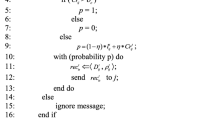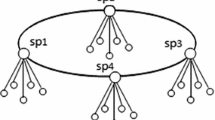Abstract
Considering the fact that P2P (Peer-to-Peer) systems are self-organized and autonomous, social-control mechanism (like trust and reputation) is essential to evaluate the trustworthiness of participating peers and to combat the selfish, dishonest and malicious peer behaviors. So, naturally, we advocate that P2P systems that gradually act as an important information infrastructure should be multi-disciplinary research topic, and reflect certain features of our society. So, from economic and social perspective, this paper designs the incentive-compatible reputation feedback scheme based on well-known economic model, and characterizes the social features of trust network in terms of efficiency and cost. Specifically, our framework has two distinctive purposes: first, from high-level perspective, we argue trust system is a special kind of social network, and an accurate characterization of the structural properties of the network can be of fundamental importance to understand the dynamics of the system. Thus, inspired by the concept of weighted small-world, this paper proposes new measurements to characterize the social properties of trust system, that is, high global and local efficiency, and low cost; then, from relative low-level perspective, we argue that reputation feedback is a special kind of information, and it is not free. So, based on economic model, VCG (Vickrey-Clarke-Grove)-like reputation remuneration mechanism is proposed to stimulate rational peers not only to provide reputation feedback, but truthfully offer feedback. Furthermore, considering that trust and reputation is subjective, we classify the trust into functional trust and referral trust, and extend the referral trust to include two factors: similarity and truthfulness, which can efficiently reduce the trust inference error. The preliminary simulation results show the benefits of our proposal and the emergence of certain social properties in trust network.
Similar content being viewed by others
References
Sergio M, Hector G M. Limited reputation sharing in P2P systems. In Proc. the 5th ACM Conference on Electronic Commerce (EC), New York, USA, 2004, pp.91–101.
Sonja Buchegger, Jean-Yves Le Boudec. A robust reputation system for P2P and mobile Ad-hoc networks. In Proc. the Second Workshop on the Economics of Peer-to-Peer Systems (P2PEcon), Harvard University, Cambridge, MA, June 2004.
Minaxi Gupta, Paul Judge, Mostafa Ammar. A reputation system for Peer-to-Peer networks. In Proc. the ACM Int. Workshop on Network and Operating Systems Support for Design Audio and Video (NOSSDAV), Monterey, CA, USA, 2003, pp.144–152.
Rohit Gupta, Arun K. Somani. Reputation management framework and its use as currency in large-scale Peer-to-Peer networks. In Proc. the 4th International Conference on Peer-to-Peer Computing (P2P), Zurich, Switzerland, 2004, pp.124–132.
Prashant Dewan, Partha Dasgupta. Securing P2P networks using peer reputations: Is there a silver bullet? In Proc. IEEE Consumer Communications and Networking Conference (CCNC), Las Vegas, US, 2005, pp.30–36.
Jianhua Ma et al. Ubisafe Computing: Vision and Challenges (I). In Proc. the 3rd International Conference on Autonomic and Trusted Computing (ATC), Wuhan and Three gorges, China, LNCS 4158, 2006, pp.386–397.
Ken’ichi Takahashi, Zhaoyu Liu, Kouichi Sakurai, Makoto Amamiya. An approach of trusted program generation for user-responsible privacy. In Proc. the 4th International Conference on Ubiquitous Intelligence and Computing (UIC), Hongkong, China, July 2007, pp.1159–1170.
Zhang Y, Fujise M. Security management in the next generation wireless networks. International Journal of Network Security (IJNS), 2006, 3(1): 1–7.
Chuang Lin, Xue-Hai Peng. Research on network architecture with trustworthiness and controllability. Journal of Computer Science and Technology, 2005, 21(5): 732–739.
Adar E, Huberman B. Free riding on Gnutella. FirstMonday, 2000, 5(10).
Miller N H, Resnick P, Zeckhauser R J. Eliciting honest feedback in electronic markets. KSG Working Paper Series, RWP02–039, 2002.
Radu Jurca, Boi Faltings. An incentive-compatible reputation mechanism. In Proc. IEEE Conference on E-Commerce (CEC), California, USA, 2003, pp.285–292.
Jøsang A, Hayward R, Pope S. Trust network analysis with subjective logic. In Proc. the 29th Australasian Computer Science Conference, 2006, pp.85–94.
Jøsang A, Ismail R, Boyd C. A survey of trust and reputation systems for online service provision. Decision Support Systems, 2007, 43(2): 618–644.
Wang Y, Vassileva J. Trust-based community formation in peer-to-peer file sharing networks. In Proc. the IEEE/WIC/ACM Int. Conf. Web Intelligence (WI), Beijing, China, 2004, pp.341–348.
Zhou R, Hwang K. PowerTrust: A robust and scalable reputation system for trusted P2P computing. IEEE Trans. Parallel and Distributed Systems, 2007, 18(4): 460–473.
Sergio Marti, Prasanna Ganesan, Hector Garcia-Molina. SPROUT: P2P routing with social networks. In Proc. the International Workshop on Peer-to-Peer Computing and DataBases (P2P and DB), 2004, Heraklion, Crete, Greece, pp.425–435.
Lee S, Sherwood R, Bhattacharjee B. Cooperative peer groups in NICE, In Proc. IEEE Conf. Computer Comm. (INFOCOM), San Francisco, USA, 2003, pp.1272–1282.
Tim Moreton, Andrew Twigg. Enforcing collaboration in Peer-to-Peer routing services. In Proc. the First International Conference on Trust Management, Heraklion, Crete, Greece, 2003, pp.255–270.
Gayatri S, Zhao B Y, Almeroth K. Decoupling service and feedback trust in a Peer-to-Peer reputation system. In Proc. the 1st International Workshop on Applications and Economics of Peer-to-Peer Systems (AEPP), Nanjing, China, 2005, pp.82–90.
Wang Y, Vassileva J. Trust and reputation model in Peer-to-Peer networks. In Proc. the 3rd Int. Conf. Peer-to-Peer Computing, Linkoping, Sweden, 2003, pp.372–378.
Papaioannou T G, Stamoulis G D. An incentives’ mechanism promoting truthful feedback in Peer-to-Peer systems. In Proc. the 5th IEEE/ACM International Symposium in Cluster Computing and the Grid, Cardiff, Wales, UK, 2005, pp.275–283.
Noam Nisan, Amir Ronen. Algorithmic mechanism design. Games and Economic Behavior, 2001, 35: 166–196.
Joan Feigenbaum, Scott Shenker. Distributed algorithmic mechanism design: Recent results and future directions. In Proc. the 6th International Workshop on Discrete Algorithms and Methods for Mobile Computing and Communications, Atlanta, Georgia, USA, 2002, pp.1–13.
Latora V, Marchiori M. Economic small-world behavior in weighted networks. The European Physical Journal B, 2003, 32: 249–263.
Dave Levin. Punishment in selfish wireless networks: A game theoretic analysis. In Proc. the First Workshop on the Economics of Networked Systems (NetEcon), Ann Arbor, Michigan, USA, 2006, pp.9–14.
Datta A, Hauswirth M, Aberer K. Beyond ‘web of trust’: Enabling P2P e-commerce. In Proc. the IEEE International Conference on E-Commerce (CEC), Newport Beach, CA, USA, 2003, pp.303–312.
Jsang A, Ismail R. The Beta Reputation system. In Proc. the 15th Bled Electronic Commence Conference, June 2002.
Saurabh Ganeriwal, Mani B. Srivastava. Reputation-based framework for high integrity sensor networks. In Proc. the 2nd ACM Workshop on Security of Ad Hoc and Sensor Networks (SASN), Washington, USA, 2004, pp.66–77.
Yufeng Wang, Yoshiaki Hori, Kouichi SAKURAI. Economic-inspired truthful reputation feedback mechanism in P2P networks. In Proc. The IEEE 11th International Workshop on Future Trends of Distributed Computing Systems (FTDCS), Sedona, AZ, USA, 2007, pp.80–88.
Watts D J, Strogatz S. Collective dynamics of ‘small-world’ networks. Nature, 1998, 393: 440–442.
Li Xiong, Ling Liu. PeerTrust: Supporting reputation-based trust for Peer-to-Peer electronic communities. IEEE Trans. Knowledge and Date Engineering, 2004, 16(7): 843–857.
Dongyu Qiu, Srikant R. Modeling and performance analysis of BitTorrent-like Peer-to-Peer networks. In Proc. the 2004 Conference on Applications, Technologies, Architectures, and Protocols for Computer Communications, Portland, Oregon, USA, 2004, pp.367–378.
Nikitas Liogkas, Robert Nelson, Eddie Kohler, Lixia Zhang. Exploiting BitTorrent for fun (but not profit). In Proc. the 5th International Workshop on Peer-to-Peer System (IPTPS), Santa Barbara, CA, USA, 2006.
Sepandar D. Kamvar, Mario T. Schlosser, Hector Garcia-Molina. The EigenTrust algorithm for reputation management in P2P networks. In Proc. the Twelfth International World Wide Web Conference (WWW), Budapest, Hungary, 2003, pp.640–651.
Shanshan Song, Kai Hwang, Runfang Zhou, Yu-Kwong Kwok. Trusted P2P Transactions with Fuzzy Reputation Aggregation. IEEE Internet Computing, 2005, 9(6): 24–34.
Newman M. The structure and function of complex networks. SIAM Review, 2003, 45: 167–256.
Jackson Matthew O, Rogers Brian W. The economics of small worlds. Journal of the European Economic Association, 2005, 3(2/3): 617–627.
Author information
Authors and Affiliations
Corresponding author
Additional information
This work was partly supported by the 21st Century COE Program “Reconstruction of Social Infrastructure Related to Information Science and Electrical Engineering” in Kyushu University, Japan, and by the National Grand Fundamental Research 973 Program of China under Grant No. 2007CB310607, the National Natural Science Foundation of China under Grant Nos. 60472067, 60572131 and JiangSu Education Bureau (Grant No. 5KJB510091).
Electronic Supplementary Material
Below is the link to the electronic supplementary material.
Rights and permissions
About this article
Cite this article
Wang, YF., Hori, Y. & Sakurai, K. Characterizing Economic and Social Properties of Trust and Reputation Systems in P2P Environment. J. Comput. Sci. Technol. 23, 129–140 (2008). https://doi.org/10.1007/s11390-008-9118-y
Received:
Revised:
Published:
Issue Date:
DOI: https://doi.org/10.1007/s11390-008-9118-y




